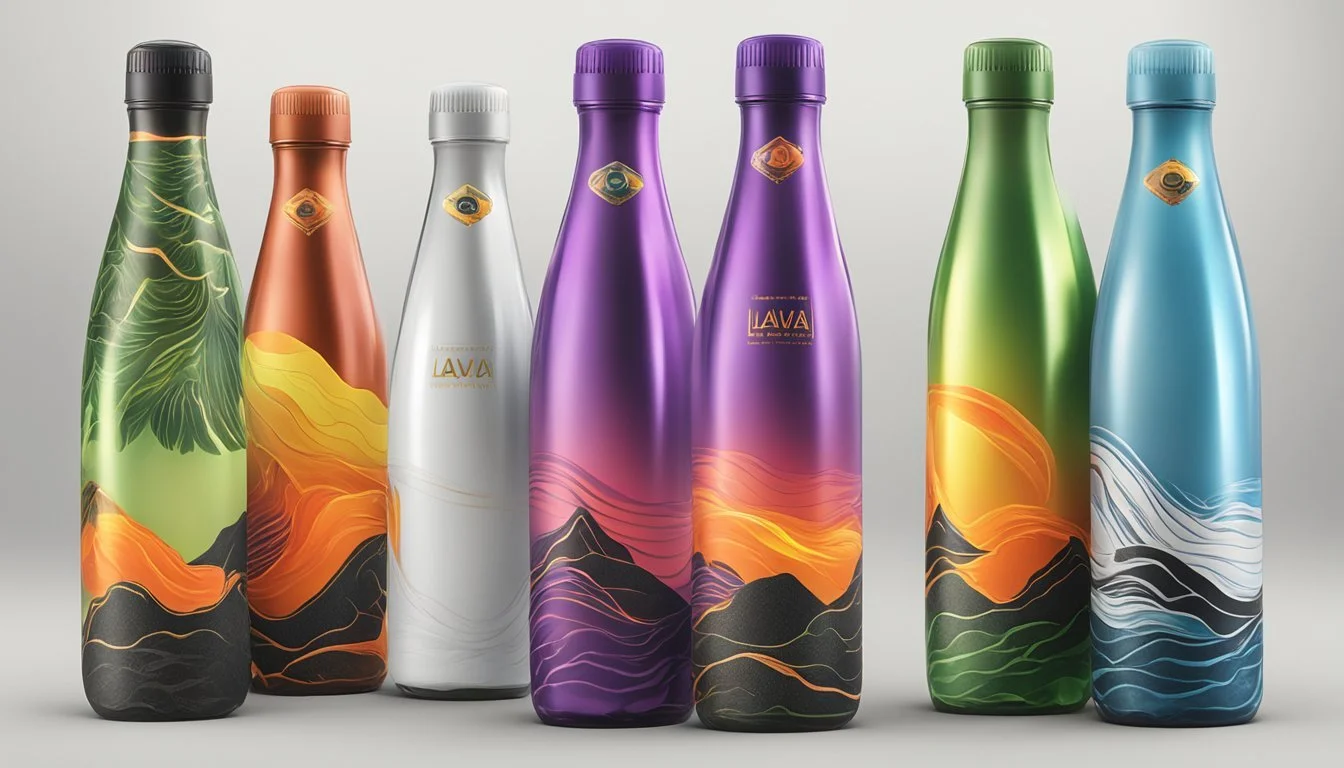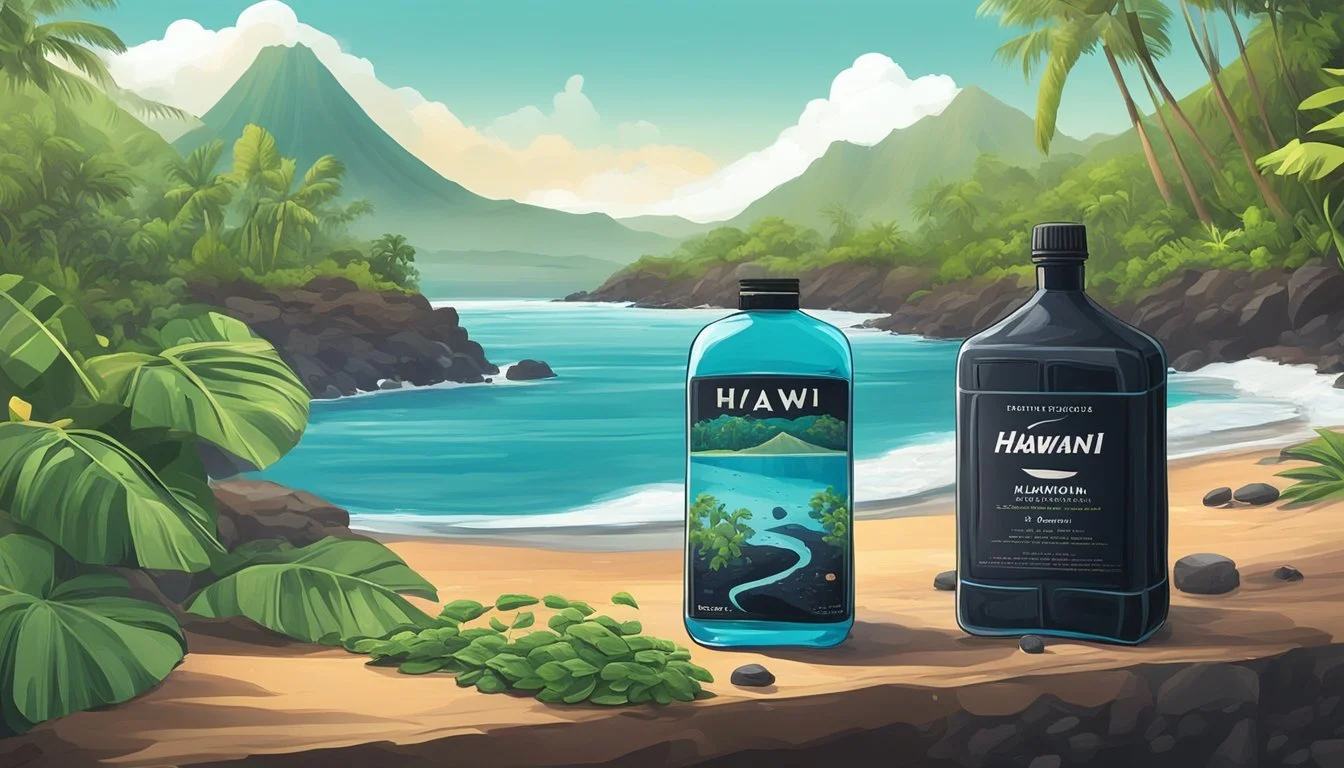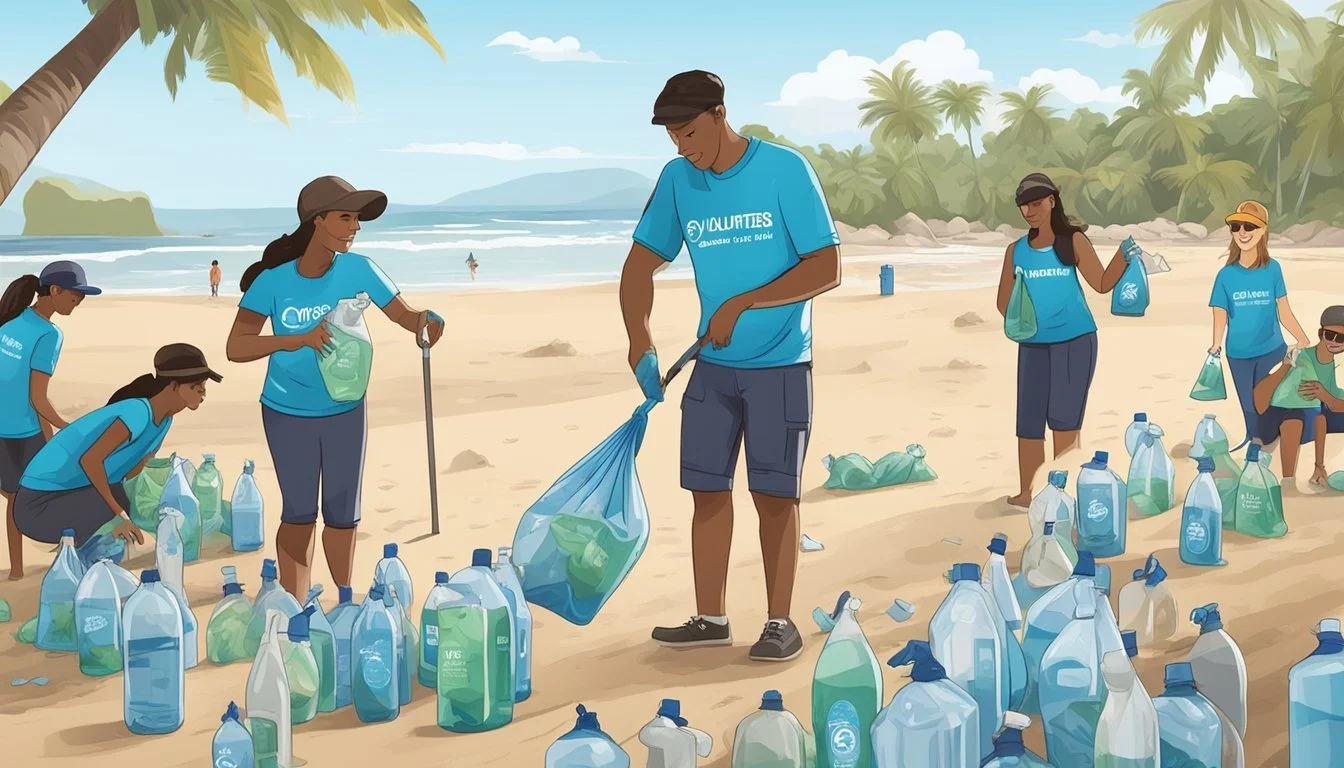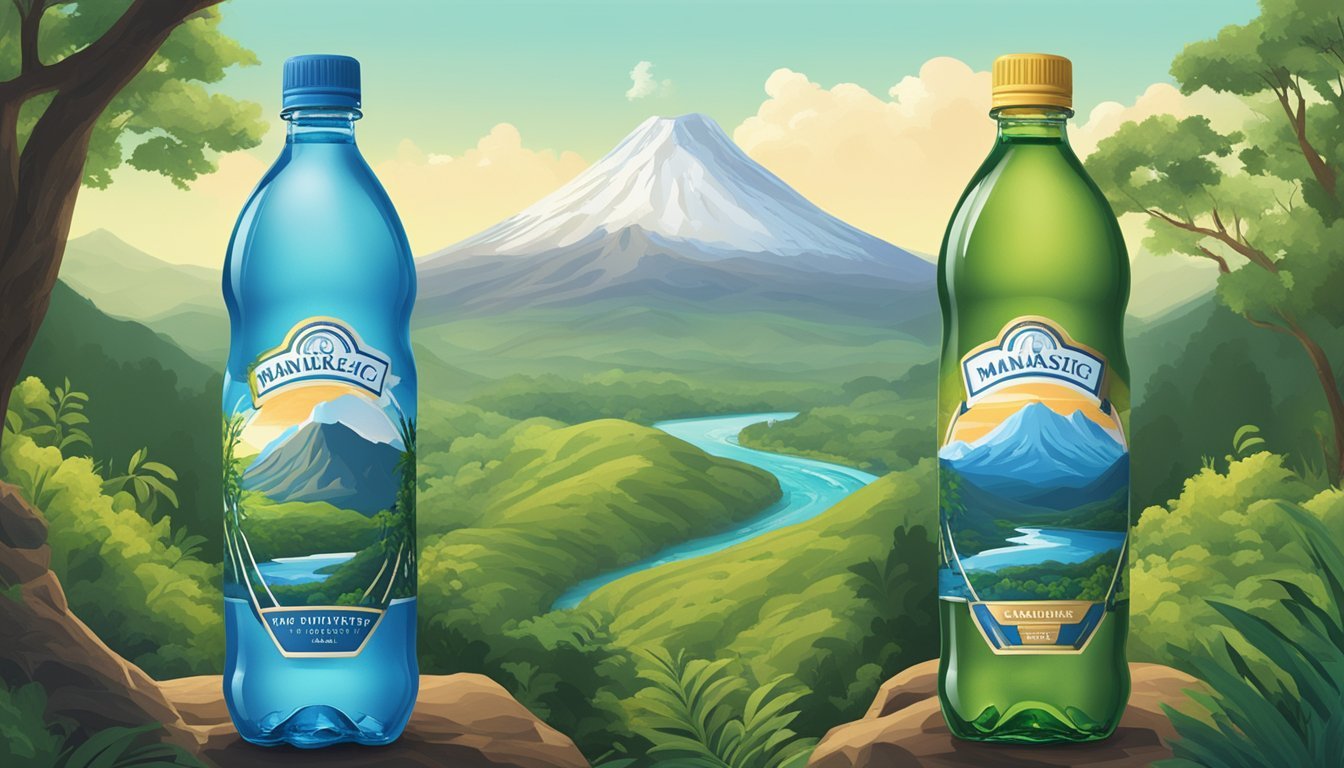Hawai’i Volcanic vs. Blk
Which Bottled Water is Better?
When it comes to premium bottled water options, two notable contenders are Hawai’i Volcanic Water and Blk Water. Each offers a unique twist on hydration that sets them apart in the competitive market. Hawai’i Volcanic Water stands out for its naturally sourced, slightly acidic profile with a reported TDS of 40 ppm, making it a refreshing choice for those who appreciate a hint of tang in their water.
Blk Water, on the other hand, intrigues consumers with its deep obsidian color, derived from the infusion of fulvic trace minerals. This distinctive appearance isn't just for show; Blk Water claims potential health benefits, making it a conversation starter and a functional beverage all at once. The fulvic acid content adds more than just a visual contrast to typical clear water.
In addition to their unique characteristics, both brands emphasize sustainability. Hawai’i Volcanic Water is sourced from the pristine volcanic regions of Hawaii, highlighting its commitment to natural purity and environmental responsibility. Blk Water leverages its innovative approach to hydration to offer a product that not only stands out visually but also aligns with modern health trends.
Understanding Bottled Water
Consumers often choose bottled water for its convenience, taste, and perceived health benefits. Key aspects to consider include the types of bottled water available and the benefits of staying hydrated.
Types of Bottled Water
There are several types of bottled water, each with its unique properties. Spring water comes from underground sources and is collected at the spring or through a borehole. It often contains natural minerals. Mineral water must come from a protected underground source and can contain a specific amount of minerals.
Artesian water is sourced from an artesian aquifer, where water is trapped under pressure between layers of rock. Purified water is usually municipal water treated to remove impurities and contaminants. Alkaline water boasts a higher pH level, often achieved through ionization or by adding alkaline minerals.
Volcanic water like Waiākea is filtered through volcanic rock, enriching it with natural minerals and providing a distinctive taste. Understanding these differences helps consumers make informed choices based on health benefits, mineral content, and personal preferences.
Benefits of Hydration
Hydration is vital for maintaining overall health and well-being. Proper hydration regulates body temperature, helps maintain electrolyte balance, and supports the immune system. Drinking adequate water can improve skin health and enhance physical performance.
Premium waters such as volcanic and alkaline waters offer additional benefits. Alkaline water's higher pH level can help neutralize body acidity, potentially supporting better health. The natural minerals found in volcanic water, like silica, can benefit skin, hair, and nails.
Staying hydrated is crucial for supporting digestion and nutrient absorption. It's also essential for cognitive function and energy levels, making regular water consumption a key component of a healthy lifestyle.
Analyzing the Source
Hawaiian Volcanic Water originates from the Mauna Loa volcano, utilizing nature's filtration through porous lava rock. Both the filtration and replenishment processes play crucial roles in defining its quality.
Mauna Loa: A Natural Filter
Mauna Loa, located on the Big Island of Hawaii, serves as a natural filtration system for Hawaiian Volcanic Water. Rainwater that falls on Mauna Loa travels through approximately 14,000 feet of porous lava rock.
This volcanic filtration process is key to the purity of the water.
The porous lava rock acts like a sieve, trapping impurities and enriching the water with minerals such as calcium, magnesium, and silica. These minerals contribute to the slightly alkaline pH level of Hawaiian Volcanic Water, which is beneficial for neutralizing body acidity.
Replenishment and Rainfall
Replenishment of Hawaiian Volcanic Water is driven by the frequent rainfall on Mauna Loa. The region experiences near-daily rain, ensuring a consistent supply of fresh water.
This natural replenishment contributes to the sustainability of the water source.
Considering the remote and pristine environment, the water remains uncontaminated by industrial pollutants. Sustainable sourcing practices are employed to minimize environmental impact, ensuring that the extraction does not harm the local ecosystem or deplete natural resources.
Health and Nutritional Value
Both Hawai’i Volcanic and Blk water offer distinct health benefits and nutritional profiles. They each contain essential minerals and exhibit varied pH levels, which play a vital role in their overall health benefits.
Essential Minerals and Electrolytes
Hawai'i Volcanic water is rich in silica, a mineral that supports bone, hair, skin, and nail health. It flows through volcanic rock, picking up a host of natural minerals such as calcium, magnesium, and potassium.
Blk water contains fulvic and humic minerals. These trace minerals are derived from soil and rock and are known for their antioxidant properties. Fulvic acid improves nutrient absorption, while humic acid can enhance gut health.
Both brands provide electrolytes, which are essential for maintaining hydration and proper bodily functions. Hawai’i Volcanic and Blk water contribute to meeting the Recommended Daily Intake (RDI) of several key minerals.
The Significance of PH in Water
Hawai’i Volcanic water boasts a naturally alkaline pH level ranging between 7.6 and 8.2. This alkalinity can help to neutralize acid in the body, promoting a balanced pH. A balanced pH is linked to improved overall health, reduced acidity, and better hydration.
Blk water, with its unique dark hue, maintains a pH level that can vary, often falling in a neutral to slightly alkaline range. The fulvic trace minerals in Blk water contribute to maintaining a good pH balance.
Understanding the pH levels and mineral content in these waters helps consumers make informed decisions about which one better aligns with their health needs.
Environmental Impact and Sustainability
When assessing which bottled water is better, examining the environmental impact and sustainability efforts of both Hawai’i Volcanic and Blk is crucial. These aspects include the use of eco-friendly packaging, recycling practices, and broader sustainability initiatives.
Eco-Friendly Packaging and Recycling
Hawai’i Volcanic uses 100% recycled plastic (RPET) for their bottles. This approach significantly reduces environmental strain compared to traditional plastics. Specifically, RPET packaging requires 85% less energy and 99% less water during production, while also cutting carbon emissions by 79%.
On the other hand, Blk water bottles emphasize reusability. While detailed statistics on their recycling numbers aren't readily available, Blk's commitment to reusable packaging helps reduce single-use plastic waste. Both companies actively participate in recycling efforts, but Hawai’i Volcanic's comprehensive use of RPET sets a stronger example in minimizing environmental impact.
Sustainability Initiatives
Hawai’i Volcanic goes beyond packaging with initiatives like the Kōkua Initiative and Regional Reforestation projects. Their CarbonNeutral® certification highlights a commitment to offsetting their carbon footprint through various environmental projects.
Blk also undertakes several sustainability initiatives, though details may not be as extensively highlighted as Hawai’i Volcanic. They focus on reducing their carbon footprint and promoting environmental consciousness among their users.
Consumers looking for brands that prioritize the Environment and long-term Sustainability may find the comprehensive efforts of Hawai’i Volcanic to be more compelling.
Taste Profile and Palate
blk. Water has a subtle flavor due to its neutral profile, making it suitable for those who prefer minimal taste. The primary feature that sets blk. Water apart is the inclusion of fulvic minerals, which can slightly alter the taste but typically remain very mild.
Hawai’i Volcanic Water is characterized by its slightly acidic taste, indicated by a pH of about 5. This water often delivers a crisp and refreshing palate, which some might find reminiscent of a light, airy texture. The naturally occurring minerals absorbed from volcanic rocks add a unique profile that distinguishes it from typical bottled waters.
Both brands offer unique mineral content. While blk. Water is infused with fulvic minerals, Hawai’i Volcanic Water benefits from the natural filtration through volcanic rock, imparting distinct mineral qualities that can affect both taste and mouthfeel.
Taste Comparison
blk. Water
Flavor: Neutral, very subtle
Mineral Additives: Fulvic minerals
Texture: Smooth, light
Hawai’i Volcanic Water
Flavor: Slightly acidic
Mineral Source: Volcanic rocks
Texture: Crisp, light
The purity of both waters is notable, yet they cater to different taste preferences. blk. Water's minimalistic approach contrasts with Hawai’i Volcanic Water's naturally enhanced palate. The volcanic origin of Hawai’i Volcanic Water adds layers that some might find more complex or enjoyable.
Lastly, Hawai’i Volcanic Water may offer a hint of sweet due to its natural elements, subtly enhancing its freshness and making it more palatable for those who enjoy a slight flavor in their water.
Social Responsibility and Community Involvement
When comparing Hawai’i Volcanic and Blk bottled waters, their commitment to social responsibility and community involvement is a significant point of consideration. Both brands emphasize ethical business practices and contributions to clean water initiatives.
Supporting Global Access to Clean Water
Hawai’i Volcanic has made impactful efforts in supporting global access to clean water. Their collaboration with organizations like Pump Aid aims to provide sustainable water solutions for communities in need. Through these partnerships, Hawai’i Volcanic ensures that a portion of its profits helps fund projects that deliver clean and safe drinking water.
Blk, on the other hand, actively supports clean water initiatives through its "Positive Change" campaign. This initiative focuses on raising awareness about the importance of clean water and funding solutions for water-scarce regions. By engaging with local and international organizations, Blk amplifies efforts to bring clean water to more people globally.
Brand Partnerships and Charities
Hawai’i Volcanic has established partnerships with numerous charitable organizations to bolster its social responsibility initiatives. Notable collaborations include their work with Mana and other ethical partners, aiming to create a broader positive impact. These alliances help Hawai’i Volcanic sustain programs that address not only water scarcity but also environmental conservation.
Blk’s approach to community involvement includes strategic partnerships with charities that focus on health and wellness. By working closely with these organizations, Blk ensures their contributions are directed towards meaningful and sustainable change. Their subscription model also allows customers to contribute to ongoing charitable efforts, making it easier for consumers to support positive causes through their purchasing choices.
In summary, both Hawai’i Volcanic and Blk demonstrate a strong commitment to ethical business practices and community involvement, with targeted efforts to support clean water access and partnerships that enhance their social impact.
Comparative Analysis
Hawai’i Volcanic Water and Blk Water each offer distinct advantages and drawbacks. Key points to consider are their mineral content, purity, cost-effectiveness, and accessibility.
Mineral Content and Purity
Hawai’i Volcanic Water is praised for its mineral-rich composition. The water filters through volcanic rock, picking up essential minerals like silica and calcium, which are beneficial to hair, skin, and nail health. The process results in water with a moderate TDS level, signifying a balanced concentration of dissolved solids.
In contrast, Blk Water stands out with its infusion of fulvic trace minerals, which give it a unique obsidian hue. Though it contains diverse organic acids, it lacks the naturally alkaline properties of Hawai’i Volcanic Water. This makes it less suitable for those seeking alkaline ionized water. Blk Water tends to have a variable TDS level, which can be lower than that of Hawai’i Volcanic Water, indicating fewer dissolved solids.
Cost-Effectiveness and Accessibility
Cost and convenience are pivotal in choosing between Hawai’i Volcanic Water and Blk Water. Hawai'i Volcanic Water is priced at a premium, reflecting its high mineral content and purity. The cost per bottle can be higher compared to standard bottled water, making it a more significant investment for consumers.
Blk Water is relatively more accessible through mainstream outlets like Amazon. It is available in various subscription models, which can reduce cost per bottle for regular users. This convenience factor makes Blk Water more readily available in the United States, whereas Hawai’i Volcanic Water might require sourcing through specialized vendors or direct purchases from the brand's website.
Both options cater to different consumer needs, balancing mineral content with cost and accessibility considerations.
Closing Remarks
Both Hawai’i Volcanic Water and Blk Water provide unique characteristics catering to different preferences.
Health Benefits:
Hawai’i Volcanic Water, particularly brands like Waiakea, is known for its naturally high alkaline pH and mineral content, including silica that supports hair, skin, and nail health. Blk Water, enriched with fulvic minerals, claims benefits like enhanced hydration and nutrient absorption.
Taste:
Hawai’i Volcanic Water, with its crisp and clean taste, is often preferred by those seeking a fresh, light flavor. Blk Water, notable for its distinctive black color due to fulvic minerals, has a slightly different taste profile which some find appealing.
Sustainable and Ethical Practices:
Hawai’i Volcanic Water brands, such as Waiakea, emphasize sustainability by using 100% RPET bottles and supporting regional environmental initiatives. Blk Water also promotes environmental consciousness by using eco-friendly packaging.
Key Points Comparison:
Attribute Hawai’i Volcanic Water Blk Water Alkaline pH Yes (7.6 to 8.8) No Mineral Content High (Silica, Electrolytes) Fulvic Minerals Taste Crisp, Light Distinctive, Slightly Earthy Sustainability 100% RPET Bottles, Eco Initiatives Eco-Friendly Packaging Color Clear Black
Each option offers specific benefits depending on individual needs. Everyone should consider what is most important to them when choosing between these two brands. Quality, taste, and environmental impact can play substantial roles in making the final decision.
More About Hawai’i Volcanic
Acqua Pana vs Hawaii Volcanic: Which Bottled Water is Better?
Antipodes vs Hawaii Volcanic: Which Bottled Water is Better?
Aqua Carpatica vs Hawaii Volcanic: Which Bottled Water is Better?
Arrowhead vs Hawaii Volcanic: Which Bottled Water is Better?
Boxed Water vs Hawaii Volcanic: Which Bottled Water is Better?
Castle Rock vs Hawaii Volcanic: Which Bottled Water is Better?
Core Hydration vs Hawaii Volcanic: Which Bottled Water is Better?
Deer Park vs Hawaii Volcanic: Which Bottled Water is Better?
Hawaii Volcanic vs 1907water: Which Bottled Water is Better?
Hawaii Volcanic vs Alkaline88: Which Bottled Water is Better?
Hawaii Volcanic vs Big Chill: Which Bottled Water is Better?
Hawaii Volcanic vs BodyArmor: Which Bottled Water is Better?
Hawaii Volcanic vs Cascade Mountain: Which Bottled Water is Better?
Hawaii Volcanic vs CBD Living: Which Bottled Water is Better?
Hawaii Volcanic vs Crystal Geyser: Which Bottled Water is Better?
Hawaii Volcanic vs Crystal Lake: Which Bottled Water is Better?
Hawaii Volcanic vs Essence pH10: Which Bottled Water is Better?
Hawaii Volcanic vs Kirkland Signature: Which Bottled Water is Better?
Hawaii Volcanic vs Liquid Death: Which Bottled Water is Better?
Hawaii Volcanic vs Open Water: Which Bottled Water is Better?
Hawaii Volcanic vs Proud Source: Which Bottled Water is Better?
Hawaii Volcanic vs Pure Life: Which Bottled Water is Better?
Hawaii Volcanic vs Purely Sedona: Which Bottled Water is Better?
Hawaii Volcanic vs Richard's Rainwater: Which Bottled Water is Better?
Hawaii Volcanic vs Simple Truth: Which Bottled Water is Better?
Hawaii Volcanic vs Talking Rain AQA: Which Bottled Water is Better?
Hawaii Volcanic vs Weird Water: Which Bottled Water is Better?
Hawaii Volcanic vs Whole Foods 365: Which Bottled Water is Better?
Hawaii Volcanic vs Whole Foods Italian Still Mineral water: Which Bottled Water is Better?
Hawaiian Springs vs Hawaii Volcanic: Which Bottled Water is Better?
Ice Mountain vs Hawaii Volcanic: Which Bottled Water is Better?
Icelandic Glacial vs Hawaii Volcanic: Which Bottled Water is Better?
Just Water vs Hawaii Volcanic: Which Bottled Water is Better?
Mountain Valley Spring Water vs Hawaii Volcanic: Which Bottled Water is Better?
Nestle Pure Life vs Hawaii Volcanic: Which Bottled Water is Better?
Poland Spring vs Hawaii Volcanic: Which Bottled Water is Better?
San Pellegrino vs Hawaii Volcanic: Which Bottled Water is Better?
Smartwater vs Hawaii Volcanic: Which Bottled Water is Better?
Solan de Cabras vs Hawaii Volcanic: Which Bottled Water is Better?
Topo Chico vs Hawaii Volcanic: Which Bottled Water is Better?
Zephyrhills vs Hawaii Volcanic: Which Bottled Water is Better?







